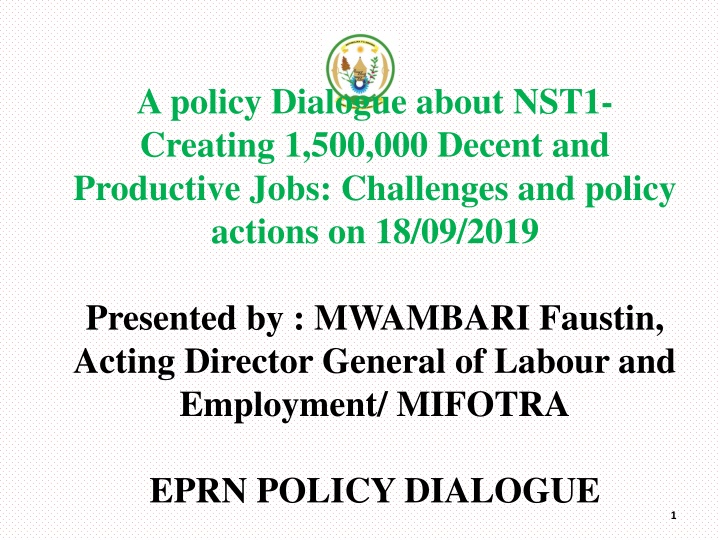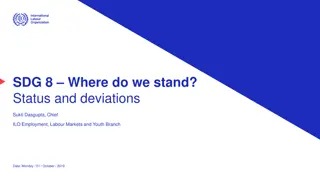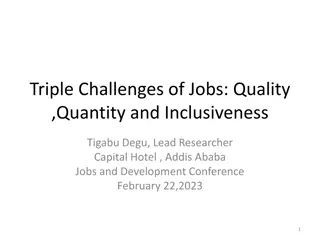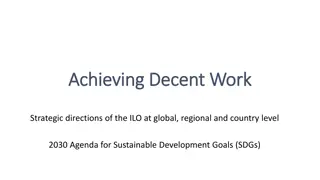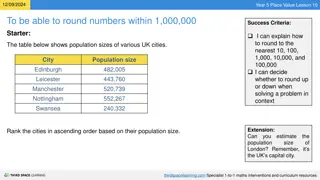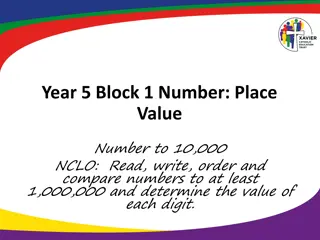Challenges and Policy Actions for Creating 1,500,000 Decent Jobs by 2024
Creation of jobs is essential for economic development and poverty reduction. The National Strategy for Transformation (NST) in Rwanda aims to create 1,500,000 decent and productive jobs by 2024 through various strategic interventions. Vision 2020 and the 7-Year Government Program (7YGP) also target job creation through initiatives like promoting job-rich projects, supporting youth in business development, increasing TVET enrollment, and monitoring coordination for job creation.
Download Presentation

Please find below an Image/Link to download the presentation.
The content on the website is provided AS IS for your information and personal use only. It may not be sold, licensed, or shared on other websites without obtaining consent from the author.If you encounter any issues during the download, it is possible that the publisher has removed the file from their server.
You are allowed to download the files provided on this website for personal or commercial use, subject to the condition that they are used lawfully. All files are the property of their respective owners.
The content on the website is provided AS IS for your information and personal use only. It may not be sold, licensed, or shared on other websites without obtaining consent from the author.
E N D
Presentation Transcript
A policy Dialogue about NST1- Creating 1,500,000 Decent and Productive Jobs: Challenges and policy actions on 18/09/2019 Presented by : MWAMBARI Faustin, Acting Director General of Labour and Employment/ MIFOTRA EPRN POLICY DIALOGUE 1
I. Introduction Creation of jobs is crucial to the achievement of economic development and social progress, and furthermore, acknowledged as the main route through which people get out of poverty. The government vision is to create more jobs ,inclusive jobs and better jobs(the quantity and quality) will be achieved through implementing different policies and programs. The progress made in jobs creation come from joint effort between the Government Rwanda, Private Sector, Financial Institutions, Civil Society Organizations and NGOs. The Sustainable Development Goals (Goal 8.) states that there is a need to promote sustained, inclusive and sustainable economic growth, full and productive employment and decent work for all. The National Strategy for transformation (NST) highlights the need to accelerate inclusive economic growth and development founded on the Private Sector, knowledge and Rwanda s Natural towards the Economic Transformation of the country. Among the key strategic interventions is to create 1,500,000 (214,000 annually) decent and productive jobs by 2024. 2
Job Creation Vision and Current Status Vision 2020 targets the creation of 200,000 off-farm job a year: National Strategy for Transformation (2018-2024) targets the creation of 1.5 million productive jobs in next 7 years -New comers: 225, 000 fleshly join the Labour Market per year -Current Job creation (2018): Economy generated 206,000 jobs annually National Employment Program is articulated under EDPRS2 and then in NST1 as one of the strategies to increase productive jobs through better planning and coordination of employment initiatives 3
Positioning Employment in 7YGP 7YGP 2017-2024 targets the creation of 1.5 million productive and decent jobs in next 7 years The 7YGP highlight the following job creation strategic interventions: Promotion and incentives to job rich projects in economic activities that are driving employment mainly (Agro processing, Horticulture, construction, tourism and hospitality, knowledge based services; and creative arts; Supporting youth in business development services and access to start up capital; Increase TVET enrolment and quality; Monitoring job creation coordination; Supporting a model project per village that creates jobs for youth. Light manufacturing, mining, performance and enhancing 4
Employment changes between 2017 and 2018 Number of jobs (main and secondary) , RLFS 2018 2018 258,829 Economic activity 2017 261,120 Net change Agriculture forestry and fishing (2,291) Mining and quarrying 63,506 48,797 14,709 Manufacturing Electricity gas stream Water supply, gas and remed Construction Whole sale and retail trade; repair Transportation and storage Accommodation and food services Information and communication Financial and insurance activities Real estate activities Professional, scientific and technical Administrative and support activities Public administration Education Human health and social work Arts, entertainment and recreation Other services Activities of households as employers Activities of extraterritorial org Total 199,650 6,157 7,995 328,531 492,120 144,735 71,075 13,827 29,098 3,883 26,488 50,782 60,014 108,553 48,909 9,990 69,567 205,712 17,174 2,216,596 157,241 9,702 9,409 276,360 487,020 125,586 45,204 11,223 23,079 3,870 25,446 36,532 55,915 112,092 49,558 10,868 56,299 195,414 9,673 2,010,407 42,409 (3,545) (1,413) 52,171 5,101 19,149 25,871 2,604 6,020 13 1,042 14,250 4,099 (3,539) (649) (878) 13,268 10,298 7,501 206,190 6
National Employment Program 2015-2019 (NEP- KORA WIGIRE 2015-2019) 7
Objectives of NEP- (Kora Wigire) The National Employment Programme (NEP- Kora Wigire) serves the following objectives: 1. Equipping the workforce with vital skills for employment and productivity, 2. Creating jobs that are adequately remunerative and sustainable across the economy with special focus on youth, women and PWD, 3. Provide a national framework for coordinating the planning and the implementation of employment interventions 8
NEP Pillars 1. Employability MINEDUC/WDA&RP) Skills Development (Led by 2. Entrepreneurship and Business Development (Led by MINICOM) 3. Labour Market Interventions(Led byMINALOC&RDB) 4. Coordination and Monitoring & Evaluation (Led by MIFOTRA&RDB) Implementing Institutions: MINICT,MIGEPROF,RDB,,WDA,RP,BDF,PSF,NIRDA,LODA,RCA,NRS,NCPD,Districts,NGOs 9
NEP-Interventions Priority Areas Pillar 1: Employability Skills Development 1. Conduct a targeted massive short-term vocational training and apprenticeship /IBT, Up-grade skills and technology for craftsmen and artisans; 17,000 benefited from the short term vocational trainings 2. Rapid Response Training; Priority given to specialized skills that are responsive to emerging investment opportunities and projects (training for jobs); 5,500 benefited from the training and 93% employed 3. Mobilize establishments and Companies to host and mentor fresh HLIs Graduates for professional internship. 7,500 graduated from internship and 59% get employed Mainstreaming internship in big investment projects. Eg. Roads Construction projects, irrigation, 10
NEP-Interventions Priority Areas 1. Proximity Business development and Advisory Services using BDAs and voucher scheme for youth and women start ups; 862 Proximity Business Development Advisers (2/sector) 60,000 micro projects benefited from BDAs subsidized services and 76% accessed loans 2. Support bankable MSMEs projects to access finance through guarantee loan, matching grant and Quasi Equity Schemes through BDF Decentralized service in partnership with other financial institutions 5,900 business projects supported through guarantee 4,700 small projects for TVET graduates acquired start up toolkit subsidized loans 3. Upgrading skills and technology for existing craftsmen and Artisans- ICPCs/Udukiriro and MIR operators Support upskilling of 250 Udukiriro operators from 19 ICPCs On going machines leasing in (Ruzisi,Nyamagabe,Rubavu, Karongi,Kirehe, Kayonza,Bugesera, Gakenke,Rwamagana,Ngororero,Gisagara,Nyabihu) Pillar 2: Entrepreneurship and Business Development 11
NEP-Interventions Priority Areas Pillar 3&4: Labour Market Intervention and 1. Support self employment of special needs groups of Women Street Vendors (3,500), IWAWA graduates (270), PWDs (2,400), AGI (430). 2. Coordination and M&E of the implementation of NEP activities and mainstreaming employment in sectors Fields visit assessment and proposal of changes to address challenges Quarterly High level technical and Ministerial Steering Committee Joint planning between implementing institutions and districts In total, in last 5 years, it is estimated that NEP have contributed to create 126,191 Jobs (FY 2014/15=24,811; 2015/16=41,672 ; 2016/17=36,206 ; 2017/18=23,502) Coordination 12
Other interventions under NST1 1. Undertaking sector skills audit to inform training programs: Energy Transport and Logistics Agro processing Mining Urbanization 2. Employment mainstreaming has been identified as a key intervention to address challenges hindering job creation and calls for all Government Entities and all Stakeholders to incorporate employment targets into their planning and budgeting processes as well as monitoring the resulting creation of jobs 13
Other interventions 3. In 2015, the Government of Rwanda adopted the Workplace Learning Policy in order to create systems, institutional structures as well as standards and regulations that ensure the full use and recognition of the country s potential of training and learning at the workplace in order to increase the relevance and marketability of skills. The interventions implemented under the Workplace Learning Policy have helped to train 825 people in dual training in 2018. 14
Policy actions and Strategies to achieve 1.5million productive and Decent Jobs Through Revised National Employment Policy the following broad interventions will be instrumental to achieve the overall policy objective to unleash Rwanda s full employment potential: Pro-employment macroeconomic framework and sectoral policies; Enterprise development and private sector competitiveness; Agricultural productivity and Rural development; Linkage between education, skills development and labour market needs; Labour mobility and migration; Formalization of informal economy; Strengthening labour market policies and labour market information system; Social protection, working conditions and productive jobs; Promotion of employment opportunities for specific groups. Strengthen Coordination, Monitoring & Evaluation 15
Underlying Challenges Skills mismatch between education and labour market needs; Limited entrepreneurship, and innovation support system; The design of financial products not adapted to youth demand; High cost of doing business for SMEs; High underemployment rate and predominance of informal sector among youth. 16
Key strategies and policy actions to address underlying challenges Put more focus on job creation in investment promotion and attraction in all sectors of the economy; Strengthen the value chain systems to promote local SMES and link them with large industries and export; Put more focus and incentives on attracting labour intensive and export oriented industries to foster job creation; Improve skills development systems through aligning education curricula with the current and future needs of the labour market; Strengthen systems to identify, attract and upskill youth with rare skills to respond to employers and investment needs; Put in each village a MODEL INCOME AND EMPLOYMENT GENERATING Business by 2024 17
Stakeholder Expectations The target of creating 1,500,000 productive and decent jobs cannot be achieved through fragmented and isolated interventions; The Employment Policy calls for sustained, targeted and concerted efforts from all stakeholders i.e Government institutions, the Private Sector, Development Partners, the Private Sector and the Civil Society, Researchers among others. It is well understood that the contribution of each and every here to achieve the Rwandans aspiration of creating 1.5 million productive and decent work. 18
Conclusion As I conclude, I thank you for your presence in this dialogue and I request you to be part of this commitment of creating 1.5 million productive and decent jobs in your respective institutions. 19
Thank you 20
